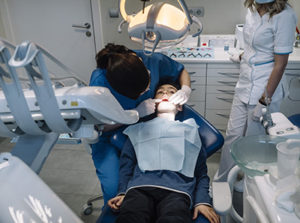If you have a tooth that has been bothering you or causing pain for weeks, or if you are experiencing jaw pain, it might be time to visit a dentist. However, is that enough? How do you know if a filling is an answer or if you need oral surgery? Your best recourse is scheduling an appointment with your dentist. That way, they can examine the cause of your pain and make treatment recommendations. To learn more, contact Lovett Dental Sharpstown today.
Do I Need Oral Surgery?
One of the most well-known oral surgeries is wisdom tooth removal. However, there are other reasons why patients need this treatment. They include the following:
- The repair or treatment of severe conditions that affect the patients face, jaw, lips, palate, or teeth
- Alleviating issues facial pain, infections, or sleep apnea causes
- If a severe accident or injury occurs, repairing damage in the maxillofacial area
- Addressing issues from a recent tooth loss
Understanding an Oral Surgeon’s Role
Oral surgeons are also called maxillofacial and oral surgeons. They are dentists who completed specialized training for an additional four years. They have advanced training in anesthesiology, as well as the diagnosis and surgical treatment of defects, diseases, and injuries of the:
- Gums
- Jaw
- Mouth
- Neck
- Soft tissues of the head
- Teeth
Preparing for Oral Surgery
If your dentist suggests oral surgery, you must prepare yourself to ensure no complications arise. These preparations also ensure a speedier recovery time. Typically, oral operations are usually outpatient procedures. Patients might also need a local or general anesthetic.
Discussing the Procedure
Before oral surgery takes place, your dentist or oral surgeon discusses the entire procedure. These professionals also detail information regarding the operations, anesthesia, and recovery time. During this time, ask questions about any discomfort you are feeling and what the recovery time entails.
Make sure you disclose all information about a health condition you have, as well as any other medical procedures you need. This information includes medications you are taking to help the dentist or surgeon prevent drug interactions or other complications.
Make a Plan for Transportation
Some patients underestimate the effects of oral surgery, as well as the sedation medication they might need. Therefore, planning for transportation following the treatment is critical. If it is not possible to arrange for a ride, then use a car or taxi service to bring you home.
Inquire About Eating and Drinking Requirements
If your dentist or oral surgeon plans on using a general or IV anesthetic, that surgery requires pre-operative guidelines. For example, patients should not eat or drink anything between eight and twelve hours before the oral surgery. That includes taking small sips of water. Patients might be able to have a light meal before surgery if the dentist or oral surgeon plans to use a local anesthetic.
Cancelling an Oral Surgery
Even though a mild cold does not have to cancel oral surgery, that does not make it any easier if you have a runny nose, are coughing, or are sneezing. If you are experiencing mild symptoms, that might be a good reason to reschedule. That way, there is no chance of potentially infecting others. Your best option is to contact your dentist or oral surgeon for guidance. If you are experiencing allergy symptoms, make sure you take an antihistamine before the treatment.
Reach Out to Lovett Dental Sharpstown Today
Are you experiencing unbearable mouth pain and wonder if you need oral surgery? Do you have a family member who is experiencing excruciating tooth pain? No one should have to go through these types of situations without help. Contact Lovett Dental Sharpstown at 281-975-5560 to learn about treatment options, as well as how we can help.
